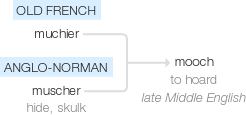Mooch
late Middle English (in the sense ‘to hoard’): probably from Old French muchier (Anglo-Norman muscher ) ‘hide, skulk’: compare with mitch. Current senses date from the mid 19th century.
wiktionary
From Middle English moochen, mouchen(“to pretend poverty”), from Old French muchier, mucier, mucer(“to skulk, hide, conceal”), from Frankish *mukjan(“to hide, conceal oneself”), from Proto-Germanic *mukjaną, *mūkōną(“to hide, ambush”), from Proto-Indo-European *(s)mūg-, *(s)mewgʰ-(“swindler, thief”).
Cognate with Old High German mūhhōn(“to store, cache, plunder”), Middle High German muchen, mucken(“to hide, stash”), Middle English müchen, michen(“to rob, steal, pilfer”). More at mitch.
Alternate etymology derives mooch from Middle English mucchen(“to hoard, be stingy”, literally “to hide coins in one's nightcap”), from Middle English mucche(“nightcap”), from Middle Dutch mutse(“cap, nightcap”), from Medieval Latin almucia(“nightcap”), of unknown origin, possibly Arabic. More at mutch, amice.
etymonline
mooch (v.)
mid-15c., "pretend poverty," probably from Old French muchier, mucier "to hide, sulk, conceal, hide away, keep out of sight," a word of uncertain origin, perhaps from Celtic or Germanic (Liberman prefers the latter, Klein the former). Also compare Middle English michen "to pilfer (small things)," mid-15c., perhaps from an Old English *mycan (compare Old High German muhhan "rob, ambush, waylay"). Or the word may be a variant of Middle English mucchen "to hoard, be stingy" (c. 1300), probably originally "to keep coins in one's nightcap," from mucche "nightcap," from Middle Dutch muste "cap, nightcap," ultimately from Medieval Latin almucia, also a word of unknown origin. Sense of "sponge off others" is recorded by 1857.
Whatever the distant origin of mooch, the [Germanic] verb *mycan and its cognates have been part of European slang for at least two millennia. [Liberman]
It appears to be a remarkably long-lived bit of slang. Related: Mooched; mooching. As a noun meaning "a moocher," from 1914; as "action of mooching," by 1867.
